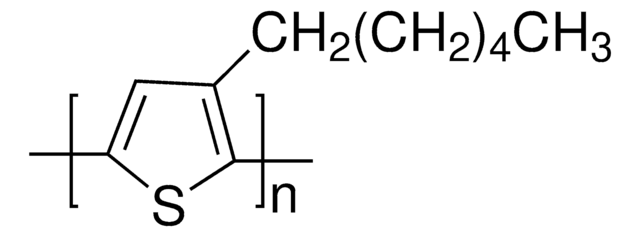900181
PEDOT:PSS
high-conductivity grade, 0.5-1 wt. % aqueous dispersion
Synonym(s):
1% Pedot/PSS, Orgacon™ S315, Poly(2,3-dihydrothieno-1,4-dioxin)-poly(styrenesulfonate)
About This Item
Recommended Products
product name
Poly(3,4-ethylenedioxythiophene)-poly(styrenesulfonate), high-conductivity grade
grade
high-conductivity grade
Quality Level
description
Visual Light Transmission (VLT): ≥ 80%
form
dispersion
greener alternative product characteristics
Design for Energy Efficiency
Learn more about the Principles of Green Chemistry.
sustainability
Greener Alternative Product
concentration
0.5-1 wt. % (PEDOT: PSS in water)
sheet resistance
<200 Ω/sq (coating : 40μ wet, drying: 6 min 130°C)
pH
2-3.5
viscosity
≤70 mPa.s(20 °C)
greener alternative category
, Enabling
storage temp.
2-8°C
SMILES string
CC1=C2OCCOC2=C(C)S1.CCC(C3=CC=CC=C3)C.C[SO3-]
General description
- low band gap
- good optical properties
- high conductivity
- low redox potential
- easy processing
- tunable film forming ability
Application
- ITO substitution coating.
- ITO-free OPV.
- Surface electrical resistance (SER) at 90% VLT* (visual light transmission): 125 Ω/square.
- Stability ratio R/R_0 (500 hr at 60 °C, 95% RH) : 1.3.
Preparation Note
- Dilute with DI water or compatible solvent if needed.
- Pre-treated substrate with corona- or plasma treatment increase adhesion.
Other Notes
- These additives have low water content (less than 100 ppm).
- Please handle under inert and moisture free environment (glove box).
- Keep containers tightly closed.
- Keep away from heat and ignition sources.
- Store in a cool and dry place.
- Avoid storing together with oxidizers.
Legal Information
Signal Word
Warning
Hazard Statements
Precautionary Statements
Hazard Classifications
Eye Irrit. 2 - Skin Irrit. 2
Storage Class Code
12 - Non Combustible Liquids
WGK
WGK 2
Flash Point(F)
Not applicable
Flash Point(C)
Not applicable
Choose from one of the most recent versions:
Already Own This Product?
Find documentation for the products that you have recently purchased in the Document Library.
Articles
Progress in Organic Thermoelectric Materials & Devices including high ZT values of >0.2 at room temperature by p-type (PEDOT:PSS) & n-type (Poly[Kx(Ni-ett)]) materials are discussed.
Professor Rivnay (Northwestern University, USA) discusses using organic mixed conductors as an alternative to efficiently bridge the ionic world of biology with contemporary microelectronics.
Recent progress in the area of solution-processed functional materials has led to the development of a variety of thin-film optoelectronic devices with significant promise in the industrial and consumer electronics fields.
Professor Chen (Nankai University, China) and his team explain the strategies behind their recent record-breaking organic solar cells, reaching a power conversion efficiency of 17.3%.
Our team of scientists has experience in all areas of research including Life Science, Material Science, Chemical Synthesis, Chromatography, Analytical and many others.
Contact Technical Service
